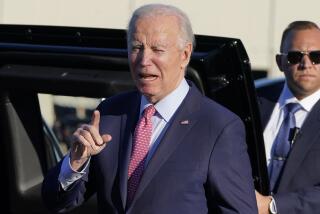Proposition 8 ruling changes the debate over same-sex marriage forever
When the evidence for and against Proposition 8 is examined in detail, it becomes obvious just how little reason there was to single out gay and lesbian couples as the only ones to be barred from marrying. That kind of examination never took place during the bitter, frenzied 2008 campaign on the initiative. But this year, U.S. District Chief Judge Vaughn R. Walker conducted a far more thoughtful inquiry during the federal trial challenging the measure. As a result, his decision Wednesday was not only welcome, but unsurprising.
Proposition 8 “fails to advance any rational basis in singling out gay men and lesbians for denial of a marriage license,” Walker wrote in his opinion. “Indeed, evidence shows Proposition 8 does nothing more than enshrine in the California Constitution the notion that opposite-sex couples are superior to same-sex couples.”
Judicial activism? Hardly. Walker’s opinion was based on the evidence presented during the trial — including the testimony of witnesses who supported the ban on same-sex marriage. They tried to defend it as rational by arguing that it would protect traditional marriage from harm, that children are better off when raised by a mother and father, and that marriage exists for “responsible procreation.”
Those arguments fell apart when a witness in favor of Proposition 8 could articulate no ways in which same-sex marriage would affect heterosexual marriages. Even if heterosexual couples make better parents — and there is ample evidence that this isn’t so — society does not try to strip marriage rights from the ones who make bad parents. Nor does society forbid the marriages of the many heterosexual couples who either cannot or choose not to have children.
In his ruling, Walker said that a key witness presented none of the credible evidence against same-sex marriage that had been promised, and that when the witness was asked about evidence demonstrating the state’s interest in procreation through marriage, he replied: “You don’t have to have evidence of this point.” The case almost certainly will be appealed all the way to the U.S. Supreme Court.
We strenuously hope that Walker’s decision will be upheld by the high court. But no matter what happens, the trial in San Francisco delivered an unforgettable lesson in what Proposition 8 and same-sex marriage really mean. From now on, it will be harder for opponents of same-sex unions to continue mouthing canards. The public as well as the courts have had an opportunity to hear the facts. The debate over same-sex marriage will never be quite the same again.
More to Read
Get the L.A. Times Politics newsletter
Deeply reported insights into legislation, politics and policy from Sacramento, Washington and beyond. In your inbox three times per week.
You may occasionally receive promotional content from the Los Angeles Times.






